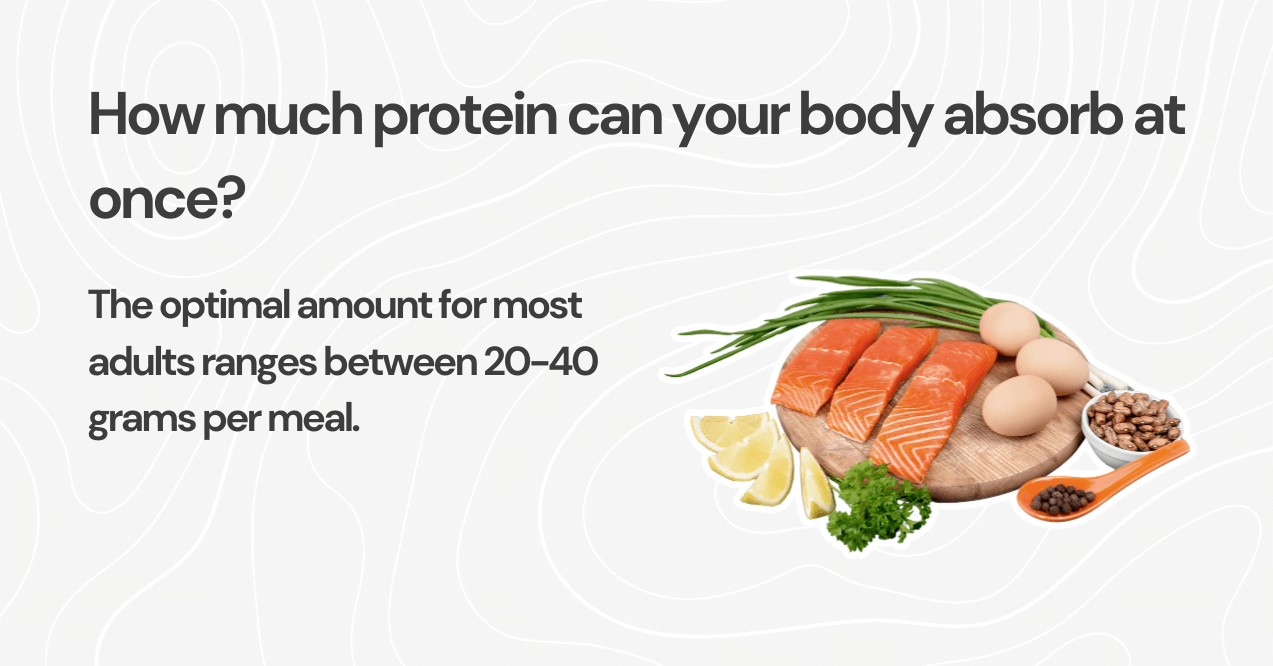How Much Protein Can Your Body Absorb?
How much protein can your body absorb is a question many active adults ask when planning their nutrition strategy. Protein serves as a building block for muscles, organs, and various bodily functions, making it an essential part of our daily nutrition. As more people focus on their fitness goals and overall well being, getting protein intake right becomes increasingly vital.
The protein absorption myth often leads people to follow rigid eating schedules or consume excessive amounts without understanding how their body actually processes this nutrient. But the truth is, your body processes protein a bit differently than most people realize. If you’re interested in learning more about optimizing your nutrition, you can check out our intermittent fasting calculator.
Key Takeaways:
What happens when you consume protein?
Your digestive system breaks down protein through a complex process that starts in your stomach. When protein-rich foods enter your stomach, specialized enzymes begin breaking the protein into smaller components called peptides. These peptides continue their journey into the small intestine, where they’re further broken down into individual amino acids.
The intestinal walls absorb these amino acids, which then enter your bloodstream for distribution throughout your body. Your body maintains tight control over amino acid levels in your blood, ensuring they reach the tissues and organs that need them most.
While planning your diet, you might start wondering – does bone broth break a fast? While technically any calories break fast, the protein and collagen content in bone broth varies by preparation method.
For those tailoring their diets to optimize protein intake, it’s also helpful to explore practical ways to enhance absorption. Adding nutrient-rich options like greens for smoothies can complement protein-rich meals by providing vitamins and minerals that support overall digestion and metabolism. Additionally, understanding what to avoid, such as overprocessed options that are among the worst foods for gut health, helps maintain the balance your body needs. Exploring creative options like the best smoothies for gut health can further ensure your nutrition plan is both effective and enjoyable.
How much protein can your body absorb at once?

The concept of protein absorption limits often gets misunderstood. Your digestive system can process significant amounts of protein – there’s no strict “cutoff point” where protein suddenly stops being absorbed. However, the real question centers on optimal utilization rather than mere absorption.
Your body processes protein continuously, but the rate and efficiency of this process vary. Research indicates that muscle protein synthesis responds most effectively to moderate amounts of protein consumed at regular intervals. While your digestive system can handle larger amounts, the benefits for muscle growth may not increase proportionally with very high protein doses.
Is 100 grams of protein too much for a single meal? While your body can certainly process this amount, it might not utilize it as efficiently as smaller portions spread throughout the day. The optimal amount for most adults ranges between 20-40 grams per meal, depending on various factors including body size and activity level.
How much protein do I need each day?
Daily protein requirements vary significantly based on individual circumstances. Adults typically need between 1 to 2 grams of protein per kilogram of body weight, depending on their physical activity level. This range provides adequate amino acids for muscle maintenance and recovery while supporting overall health.
Factors affecting your personal protein needs include:
- Activity level and type of exercise
- Body composition goals
- Age and metabolic health
- Overall caloric intake
Can you take too much protein?
While protein generally ranks as one of the safer nutrients to consume in higher amounts, excessive intake may not provide additional benefits. Your body has efficient mechanisms for processing protein, but does the body store protein? Unlike carbohydrates and fats, your body doesn’t store protein in the same way – it either uses amino acids or converts them to other compounds.
Very high protein intake might lead to:
- Digestive discomfort
- Unnecessary caloric intake
- Increased hydration needs
- Potential strain on kidney function in susceptible individuals
How much protein do you need for muscle growth?
Building and maintaining muscle requires adequate protein intake combined with appropriate exercise. For muscle growth, research suggests consuming between 1.6-2.2 grams of protein per kilogram of body weight daily.
Can you drink protein shakes without working out? While possible, the benefits of protein supplementation become most apparent when paired with resistance training.
Your muscles respond best to protein when:
- Consumed within a reasonable time after exercise
- Combined with appropriate resistance training
- Supported by adequate total daily intake
- Accompanied by sufficient calories from all macronutrients
Bone broth protein – a natural option for active adults
Bone broth protein offers a unique protein option that fits well into an active lifestyle. This traditional food, now available in convenient protein powder form, contains concentrated proteins along with naturally occurring compounds that support overall wellbeing. Trumeta Bone Broth Protein provides a practical nutrition option for individuals looking to maintain their protein intake while supporting their active lifestyle.

The protein in bone broth supplements contains specific amino acid profiles that differ from common protein supplements. These proteins work together with your body’s natural processes during physical activity.
For optimal results, consider adding bone broth protein to your:
- Post-workout nutrition
- Morning routine
- Pre-workout preparation
- Daily protein intake goals
Should you spread your protein consumption throughout the day?
Distributing protein intake across multiple meals typically yields better results than consuming large amounts in one or two sittings. This approach helps maintain a steady supply of amino acids throughout the day, supporting various bodily functions including muscle protein synthesis.
Benefits of spreading protein intake include:
- More consistent energy levels
- Better nutrient utilization
- Improved satiety throughout the day
- Easier digestion
A practical approach involves:
- Including protein with each main meal
- Adding moderate protein to snacks
- Planning ahead for post-workout nutrition
- Maintaining consistent meal timing
Conclusion
While your body can process varying amounts of protein, focusing on consistent, moderate intake throughout the day typically works best for most people. Rather than fixating on exact amounts or timing, prioritize quality protein sources and regular consumption patterns.
The key lies in finding a sustainable approach that fits your lifestyle while meeting your nutritional needs. By maintaining consistent protein intake through well-planned meals and snacks, you can support your body’s various functions while working toward your health and fitness goals.
Your body doesn’t store protein like it stores carbs and fats. Instead, it breaks proteins into amino acids, using them for immediate needs or converting excess amounts into other compounds for energy use.
For most adults, 100 grams of protein per day fits within healthy intake ranges. The right amount depends on your body weight, activity level, and goals. Spread this amount across multiple meals for optimal use.
The widespread myth that your body can only absorb 30 grams of protein per meal lacks scientific backing. While absorption efficiency might vary, your body can process larger amounts – it’s the optimal utilization that matters.
Advertisement. This site offers health, wellness, fitness and nutritional information and is designed for educational purposes only. You should not rely on this information as a substitute for, nor does it replace, professional medical advice, diagnosis, or treatment. If you have any concerns or questions about your health, you should always consult with a physician or other health-care professional. Do not disregard, avoid or delay obtaining medical or health related advice from your health-care professional because of something you may have read on this site. The use of any information provided on this site is solely at your own risk.







